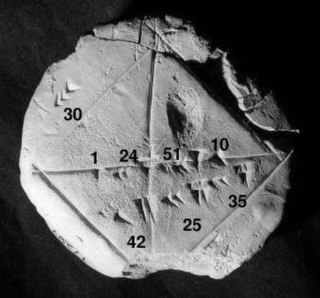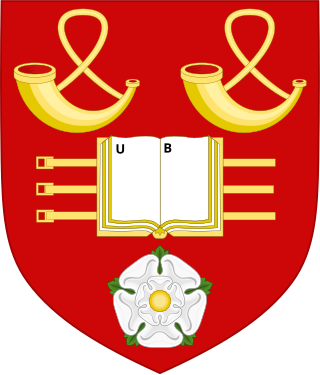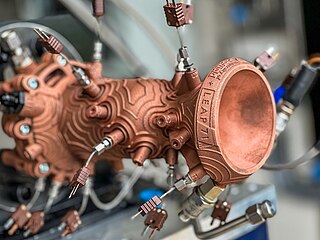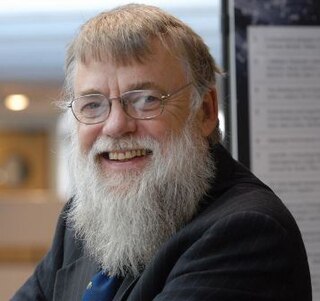
Numerical analysis is the study of algorithms that use numerical approximation for the problems of mathematical analysis. It is the study of numerical methods that attempt to find approximate solutions of problems rather than the exact ones. Numerical analysis finds application in all fields of engineering and the physical sciences, and in the 21st century also the life and social sciences like economics, medicine, business and even the arts. Current growth in computing power has enabled the use of more complex numerical analysis, providing detailed and realistic mathematical models in science and engineering. Examples of numerical analysis include: ordinary differential equations as found in celestial mechanics, numerical linear algebra in data analysis, and stochastic differential equations and Markov chains for simulating living cells in medicine and biology.

The University of Bradford is a public research university located in the city of Bradford, West Yorkshire, England. A plate glass university, it received its royal charter in 1966, making it the 40th university to be created in Britain, but can trace its origins back to the establishment of the industrial West Yorkshire town's Mechanics Institute in 1832.
E-Science or eScience is computationally intensive science that is carried out in highly distributed network environments, or science that uses immense data sets that require grid computing; the term sometimes includes technologies that enable distributed collaboration, such as the Access Grid. The term was created by John Taylor, the Director General of the United Kingdom's Office of Science and Technology in 1999 and was used to describe a large funding initiative starting in November 2000. E-science has been more broadly interpreted since then, as "the application of computer technology to the undertaking of modern scientific investigation, including the preparation, experimentation, data collection, results dissemination, and long-term storage and accessibility of all materials generated through the scientific process. These may include data modeling and analysis, electronic/digitized laboratory notebooks, raw and fitted data sets, manuscript production and draft versions, pre-prints, and print and/or electronic publications." In 2014, IEEE eScience Conference Series condensed the definition to "eScience promotes innovation in collaborative, computationally- or data-intensive research across all disciplines, throughout the research lifecycle" in one of the working definitions used by the organizers. E-science encompasses "what is often referred to as big data [which] has revolutionized science... [such as] the Large Hadron Collider (LHC) at CERN... [that] generates around 780 terabytes per year... highly data intensive modern fields of science...that generate large amounts of E-science data include: computational biology, bioinformatics, genomics" and the human digital footprint for the social sciences.
Computational science, also known as scientific computing, technical computing or scientific computation (SC), is a division of science, and more specifically the Computer Sciences, which uses advanced computing capabilities to understand and solve complex physical problems. While this discussion typically extenuates into Visual Computation, this research field of study will typically include the following research categorizations.

The Department of Computer Science is the computer science department of the University of Oxford, England, which is part of the university's Mathematical, Physical and Life Sciences Division. It was founded in 1957 as the Computing Laboratory. By 2014 the staff count was 52 members of academic staff and over 80 research staff. The 2019, 2020 and 2021 Times World University Subject Rankings places Oxford University 1st in the world for Computer Science. Oxford University is also the top university for computer science in the UK and Europe according to Business Insider. The 2020 QS University Subject Rankings places The University of Oxford 5th in the world for Computer Science.

EPCC, formerly the Edinburgh Parallel Computing Centre, is a supercomputing centre based at the University of Edinburgh. Since its foundation in 1990, its stated mission has been to accelerate the effective exploitation of novel computing throughout industry, academia and commerce.

Gene Howard Golub, was an American numerical analyst who taught at Stanford University as Fletcher Jones Professor of Computer Science and held a courtesy appointment in electrical engineering.
Lloyd Nicholas Trefethen is an American mathematician, professor of numerical analysis and until 2023 head of the Numerical Analysis Group at the Mathematical Institute, University of Oxford.

Computational Engineering is an emerging discipline that deals with the development and application of computational models for engineering, known as Computational Engineering Models or CEM. Computational engineering uses computers to solve engineering design problems important to a variety of industries. At this time, various different approaches are summarized under the term Computational Engineering, including using computational geometry and virtual design for engineering tasks, often coupled with a simulation-driven approach In Computational Engineering, algorithms solve mathematical and logical models that describe engineering challenges, sometimes coupled with some aspect of AI, specifically Reinforcement Learning.

Professor Anthony John Grenville Hey was vice-president of Microsoft Research Connections, a division of Microsoft Research, until his departure in 2014.

The Department of Engineering Science is the engineering department of the University of Oxford. It is part of the university's Mathematical, Physical and Life Sciences Division. The department was ranked third best institute in the UK for engineering in the 2021 Research Excellence Framework.

David Charles De Roure is an English computer scientist who is a professor of e-Research at the University of Oxford, where he is responsible for Digital Humanities in The Oxford Research Centre in the Humanities (TORCH), and is a Turing Fellow at The Alan Turing Institute. He is a supernumerary Fellow of Wolfson College, Oxford, and Oxford Martin School Senior Alumni Fellow.

Jeremy Gibbons is a computer scientist and professor of computing at the University of Oxford. He serves as Deputy Director of the Software Engineering Programme in the Department of Computer Science, Governing Body Fellow at Kellogg College and Pro-Proctor of the University of Oxford.

Malcolm Phillip Atkinson is a professor of e-Science, in the University of Edinburgh School of Informatics. He is known for his work in the areas of object-oriented databases, database systems, software engineering and e-Science and was the UK's first e-Science Envoy (2006–2011) and the Director of the e-Science Institute and National e-Science Centre, University of Edinburgh.
The UK Large-Scale Complex IT Systems (LSCITS) Initiative is a research and graduate education programme focusing on the problems of developing large-scale, complex IT systems. The initiative is funded by the EPSRC, with more than ten million pounds of funding awarded between 2006 and 2013.

Francine Berman is an American computer scientist, and a leader in digital data preservation and cyber-infrastructure. In 2009, she was the inaugural recipient of the IEEE/ACM-CS Ken Kennedy Award "for her influential leadership in the design, development and deployment of national-scale cyberinfrastructure, her inspiring work as a teacher and mentor, and her exemplary service to the high performance community". In 2004, Business Week called her the "reigning teraflop queen".
Professor Nigel Peter Weatherill, BSc, PhD, DSc, FIMA, C.Math, FRAeS, C.Eng, C.Sci, FREng, FRSA, DL is the former Vice-Chancellor and Chief Executive of Liverpool John Moores University (2011-2018).

Katherine "Kathy" Anne Yelick, an American computer scientist, is the vice chancellor for research and the Robert S. Pepper Professor of Electrical Engineering and Computer Sciences at the University of California, Berkeley. She is also a faculty scientist at Lawrence Berkeley National Laboratory, where she was Associate Laboratory Director for Computing Sciences from 2010–2019.

Albert Y. Zomaya is currently the Chair Professor of High Performance Computing & Networking and Australian Research Council Professorial Fellow in the School of Information Technologies, The University of Sydney. He is also the Director of the Centre for Distributed and High Performance Computing. He is currently the Editor in Chief of IEEE Transactions on Sustainable Computing and Springer's Scalable Computing and Communications. He was past Editor in Chief of the IEEE Transactions on Computers.
The Oxford e-Research Centre (OeRC) is part of the Department of Engineering Science within the University of Oxford in England and is a multidisciplinary informatics and Data science research and education institute.














